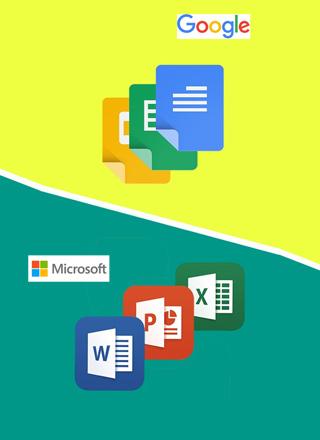- Mix
- Friday-2020-07-03 | 02:47 pm

As if it was not enough running Gmail and YouTube, two of the most significant and influential heavyweight products of the IT online scene, not to mention the ubiquitous Google search engine and Android, the operating system that dominates the mobile world with a massive 85 per cent market share, Google would love now to supplant MS Office, Microsoft’s pride and spearhead for a long time, and the true pioneer of all "office suites” as we know them.
Actually Google may have already achieved that. According to an update from last April by Shanhong Liu from statista.com: "The office suite market in the United States is split between Google’s G Suite and Microsoft’s Office 365, with G Suite being the market leader holding a share of 56.97 per cent and Office 365 occupying 42.63 per cent.” These figures are also confirmed as the world market shares as well, by datanyze.com, give or take a half per cent.
Why would people go for G Suite, Google’s answer to MS-Office, when it was Microsoft that started it all? Especially that Microsoft had taken a smart move nine years ago, almost to the day, when it introduced Office 365, its online version of MS-Office, realising at a rather early stage that sooner or later everything would go online. Moreover, MS Word and MS Excel are standards by which everything else is measured. Excel, in particular, is a kind of "undisputed world authority” when it comes to numbers and tables!
Putting details and accurate comparisons aside, the two products, G Suite and Office 365, have the same functionality and serve the same purpose, in the broad lines. They also both work based on online subscription and they both have a free though somewhat limited version. Cloud storage is another common point, with One Drive for Microsoft and Drive for Google.
They have online collaboration capability, but "as soon as the volume of collaboration-related content rises, they will have to switch to SharePoint” notes scnsoft.com when talking about Office 365.
Online collaboration may well be the key point here, perhaps along with Gmail, Google’s winning and globally adopted email messenger. It is now far ahead of Microsoft’s Hotmail, with more than five times the share size. Collaboration has been in Google’s blueprints from the beginning, which maybe explains the tremendous success of the company’s G Suite.
When you get a paid Gmail (or Pro) subscription, another interesting feature is that you can have an email address created such as for example leila@mydomain.com instead of leila@gmail.com, where "mydomain” is a domain name you own. This makes for a better business image, and a higher level of personalisation in your communication.
A smooth and efficient shared calendar is another strong point in favour or the G Suite. Naturally Office 365 also has a shared calendar (Outlook Web App) but is seems that the one in Google’s Suite is more streamlined and is highly appreciated by the users.
For now the days of Office 365 are anything but numbered. It is still a very popular Office Suite, one that has a huge fan base. Its Excel module is a reference spreadsheet software that has seen countless users write VBA code for it and who have customise it to become even more powerful and friendlier to use.
But again, the world is going towards more online collaboration, more practical use and an as perfect as possible and seamless integration of e-mail with calendars, word processing and spreadsheets. G Suite may just be a winner in this very league.










